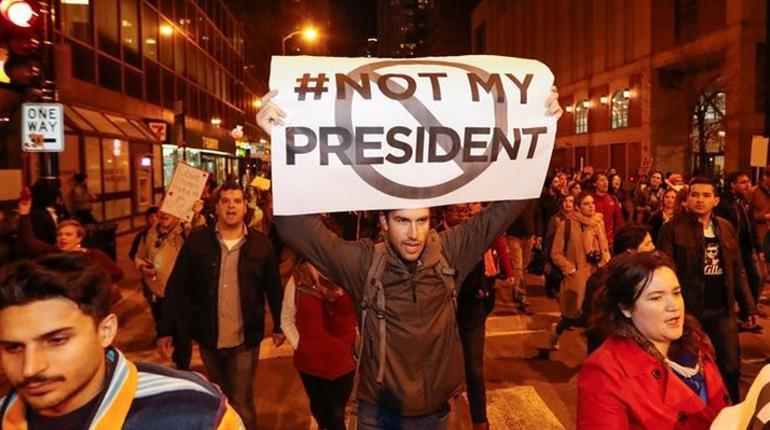Photo: Getty
The fact is, they don’t need us.
Trump’s taking the reigns of the White House chariot should be a blaring, neon-backlit alert to us all. As we write, he makes plans to parade in with a team boasting the likes of white nationalist hack Bannon and GOP mainstay Prebius. Thus, the Golden Era of Obama comes to a crashing end. Just days ago, all signs pointed to his smooth, sashaying exit–complete with witty video-skits and scenes of the President clasping hands and strolling the lawn with Michelle Obama, the newest liberal-feminist obsession.
Trump’s win snatches at the democratic veils of US governing by the ruling class. The new president-elect tightens the closed circuit of US politics: the rich ruling for the rich–a for us, by us government of the wealthiest 1% that finds no need to meddle with the masses concerning decisions on how society is run.
The experience of US-style democracy has always been something to squint at with wonder, with disgust. The elections were never democratic.
But the morning of November 9, the 76 percent of eligible voters who didn’t vote Trump woke up in a shell-shocked state. The 76 percent who would rather walk around town with a “punch me in the face” sign than affix a Trump button to their lapels, those of us who would only be caught at a Trump rally to protest and disrupt, want deeply to sentence Trump back to the hellfires of reality TV–we wondered, how the hell did this slimebucket take the president’s seat?
A bigot’s nesting place
Trump’s throne is built on massive, systematic disenfranchisement—particularly stripping poor people, workers, Blacks and immigrants of the vote. People scrambled to maneuver demanding schedules and stood in line for hours; and those lines were just plain longer in poor neighborhoods than affluent ones. Worth noting, too, is how election day falls on a Tuesday, a workday–in contrast to other countries around the world, where elections take place on a Sunday or a national holiday. People have to fake a cold or a dead relative, show up to work late, or leave early to throw in their electoral two-cents.
This election we were 868 polling places shorter than we were in 2013, when Shelby v. Holder scratched Section 4b from the 1965 Voting Rights Act, which once obliged states to adhere to federal requirements concerning election day voting practices. Among other things, the Supreme Court ruling enabled Republicans in North Carolina to place restrictions on early voting–which was, they argued in blatant anti-black terms, “disproportionately Black” and “disproportionately Democratic.”
Over 6 million people, disproportionately Black and of color, can’t vote because of a felony conviction, and about 11 million undocumented immigrants are barred from all prospects of voting.
As voting barriers multiply for the poor and oppressed, capital has gained unfettered influence over elections. The Citizens United ruling in 2010 cleared the way for SuperPACs to form, and for millions in dark money to flow to candidates from undisclosed donors. More recently, the Supreme Court lifted the cap on contributions from individuals to federal candidates and political party committees.
Then there’s the Electoral College. Since the Founding Fathers breathed life into this odd creature in 1787, there has not been one damn satisfactory explanation for this blatantly undemocratic political contraption. The Republicans and Democrats alike are quick to gripe over the EC, but never lift a finger to oppose it.
The fuzzier the rules and more tangled the ropes of democracy, the better. The democratic façade stays intact and at the same time, the will of the majority counts for little.
Not my president
We have undoubtedly seen a rightward shift in national politics. It is clear that a large portion of (almost entirely white) middle- and working-class people went for Trump, buying into–or at the least swallowing–his racist, misogynistic, anti-Muslim, anti-immigrant bigotry. The persisting economic crisis and long-term retreat of class struggle have had troubling effects on the possibilities for solidarity among workers.
But the same reactionary rhetoric that brings the radical Right to rally around Trump also consolidates the majority against him . If he stays true to his policy proposals, he will be certain to face mass resistance–as numerous protests in the last week have forecasted. Those who have already begun organizing a resistance against President Trump have spoken clearly: Not my president.
In the coming weeks and months, we can leave behind the Republicans and Democrats, who lock arms in a cynical game of staged democracy, and bring our full resistance to the streets.












